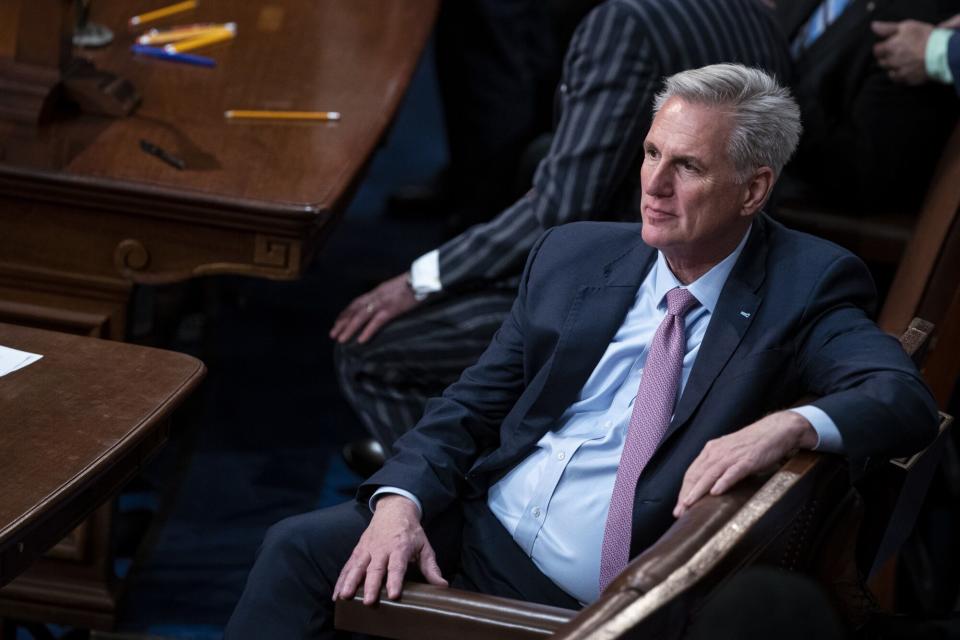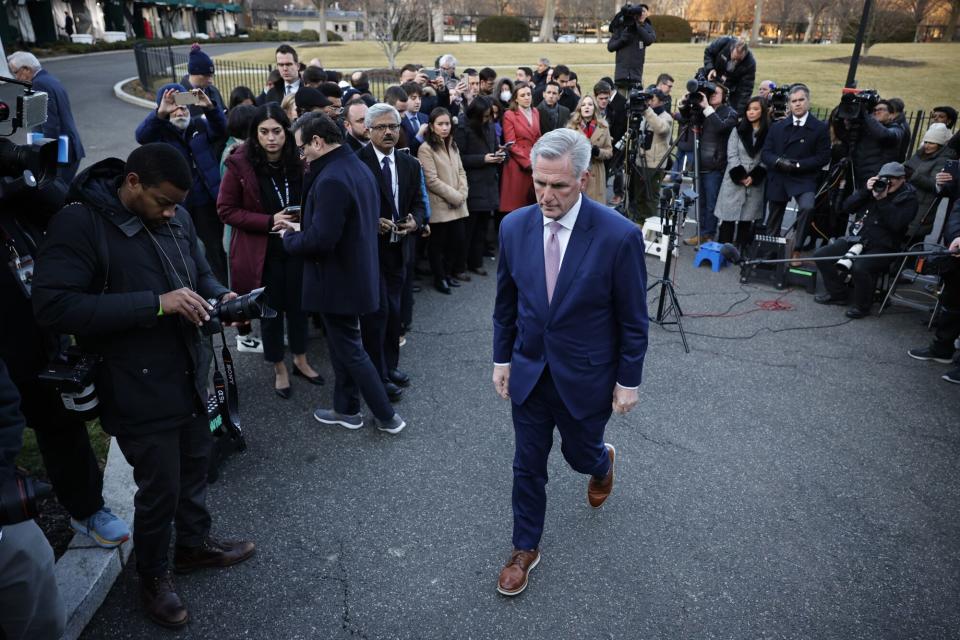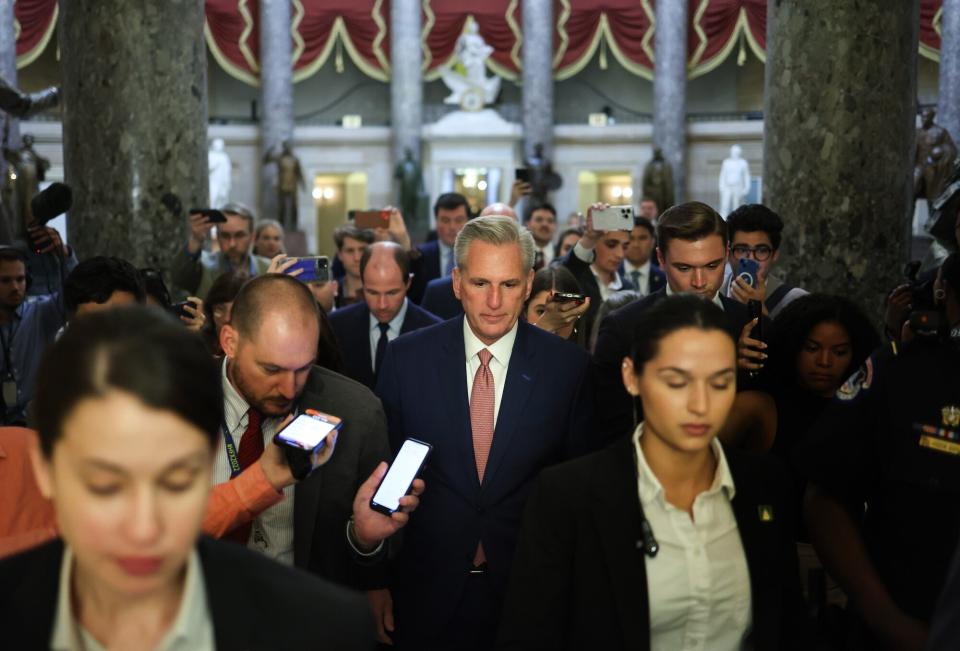Kevin McCarthy Leaving House Months After Ouster as Speaker
- Oops!Something went wrong.Please try again later.
- Oops!Something went wrong.Please try again later.
- Oops!Something went wrong.Please try again later.
- Oops!Something went wrong.Please try again later.
(Bloomberg) -- Republican Kevin McCarthy, whose brief and tumultuous turn leading the US House culminated in the first successful vote to oust a speaker, said Wednesday he will resign from Congress at the end of the year.
Most Read from Bloomberg
Elon Musk's SpaceX Valued at $175 Billion or More in Tender Offer
Apple Readies New iPads and M3 MacBook Air to Combat Sales Slump
Tech Giants Lift Stocks as AI Euphoria Rages On: Markets Wrap
Harvard, Penn Heads Walk Back Genocide Answers After Backlash
He wrote in a Wall Street Journal opinion article announcing his plans that he intends “to serve America in new ways.”
The 58-year-old California Republican styled himself as part of an emerging generation of “Young Gun” conservative leaders when Tea Party Republicans swept into power in 2010. Yet by the time he realized his ambition to become speaker McCarthy was viewed suspiciously by an ascendant populist right aligned with Donald Trump.
His departure, announced after Republican George Santos was expelled from the House last week, will cost the narrow GOP majority one more vote at least temporarily.
His seat in a heavily Republican district may be filled by a special election depending on when McCarthy submits his formal resignation. California law gives Governor Gavin Newsom some discretion on whether and when to call for a special election if McCarthy does not meet a December 8 deadline.
A Newsom spokesperson said Wednesday that the the governor was awaiting specifics from McCarthy about his planned departure.
The district in California’s Central Valley is a fertile agricultural region and the center of the state’s oil industry. Potential contenders to succeed McCarthy include Republican Devin Nunes, who left Congress to run Trump’s Truth Social online media platform, and state senator Shannon Grove, a former party leader of state senate Republicans, both outspoken Trump supporters. Another possible candidate is state assembly member Vince Fong, a former McCarthy aide.
McCarthy announced his plans to depart Congress barely two months after he lost his leadership post.
He expressed mixed feelings about remaining in Congress at a New York Times Dealbook conference on Nov. 29.
“If I decide to run again, I have to know in my heart I’m giving 110%,” he said. “Look, if you just got thrown out as speaker, you go through different stages, would you not? And then you’ve got to turn around and make a decision.”
It took an extraordinary 15 rounds of voting for McCarthy to muster the support to be elected speaker in January and the defection of just eight dissident conservatives to topple him nine months later.
McCarthy was dogged during his speakership by bitter ideological divisions among House Republicans and the party’s slender majority, which allowed him to lose only a handful of lawmakers on party-line votes.
He maintained an unsteady alliance of convenience with the party’s dominant figure, Donald Trump.
McCarthy criticized Trump as bearing “responsibility” for the Jan. 6, 2021 Capitol insurrection in the immediate aftermath but three weeks later flew to Mar-a-Lago to be photographed at the side of the former president. Trump habitually belittled McCarthy as “My Kevin” when referring to him.
Earlier this year then-Speaker McCarthy forged a deal with President Joe Biden and Senate Democrats to avert a US debt default and economic disaster. But that angered hard-line conservatives who had hoped to use the crisis as leverage to force deep federal spending cuts.
His friction with party conservatives came to a head after his decision to allow a vote on a bipartisan bill to keep federal agencies and operations funded beyond September, even though that prevented what would have been a government shutdown. His chief detractor, Representative Matt Gaetz of Florida, then led the overthrow against him in early October.
Earlier: McCarthy Ousted as US House Speaker by Republican Dissidents
The last time such a motion led to an actual vote on removing a speaker was in 1910, and that failed. The only speakers who held office for less time than McCarthy were Theodore Pomeroy, elected speaker-for-the-day on his last day in office in 1869, and Michael Kerr, who died in office in 1876 after 258 days.
It took House Republicans more than three weeks to elect a successor, Representative Mike Johnson of Louisiana.
McCarthy rose to prominence in 2010 as one of a trio of Republicans — along with former Speaker Paul Ryan and former GOP Majority Leader Eric Cantor — who proclaimed themselves the “Young Guns,” representatives of the future of conservatism. A book they co-authored portrays McCarthy as the strategist of the three.
McCarthy was the last of the group to remain in Congress. Cantor was defeated in a 2014 party primary by a populist seeking to curtail immigration. Ryan became speaker but decided not to seek reelection after two years serving under the Trump presidency.
The son of a Bakersfield, California, firefighter, McCarthy entered politics as head of the California Young Republicans, and later was chairman of the National Young Republicans.
McCarthy eventually worked for his predecessor in Congress, Republican Bill Thomas, starting as an intern and rising to the post of district director, before election to the state legislature and then Congress.
--With assistance from Karen Breslau.
Most Read from Bloomberg Businessweek
Salesforce Signals the Golden Age of Cushy Tech Jobs Is Over
How the Biggest Boutique Fitness Company Turned Suburban Moms Into Bankrupt Franchisees
After So Many False Dawns, the Market Is Convinced the Fed Will Finally Cut
The Untold Story of a Massive Hack at HHS in Covid’s Early Days
Hottest Job in US Pays $80,000 a Year, No College Degree Needed
©2023 Bloomberg L.P.




